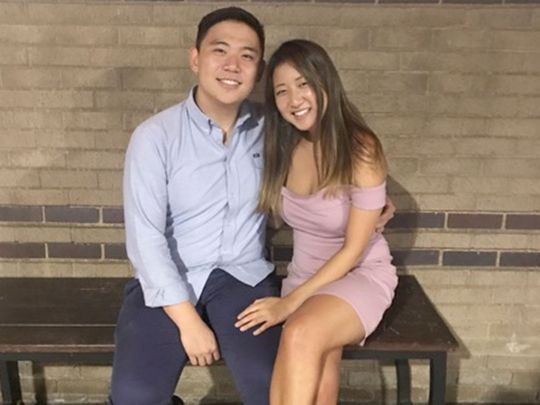
It was the day of Alexander Urtula's college graduation. He was a standout student, a biology major at Boston College, and his parents were in town to watch him receive his diploma.
But hours before the May 20 ceremony, Urtula's girlfriend, Inyoung You, tracked him to a parking garage in Boston's Roxbury neighborhood. There, authorities said, You was present as Urtula leaped to his death from the top floor after enduring months of her physical, verbal and psychological abuse.
On Monday, the Suffolk County district attorney charged You, also a Boston College student at the time, with involuntary manslaughter in Urtula's suicide - a case that closely mirrors that of Michelle Carter, who was convicted of the same charges in 2017 after encouraging her boyfriend to kill himself.
You, 21, had "complete and total control" over Urtula, 22, during their 18-month relationship, often using text messages and threats of self-harm to manipulate him, said Rachael Rollins, the district attorney.
"Many of the messages clearly display the power dynamic in the relationship wherein Ms. You made demands and threats with the understanding that she had complete and total control over Mr. Urtula, both mentally and emotionally," Rollins said at a news conference.
Getting worse
The abuse became "more frequent, more powerful and more demeaning in the days and hours leading up to" Urtula's death, Rollins said. In the two months prior, the couple exchanged more than 75,000 text messages, and at least 47,000 came from You - a stream of unrelenting abuse, the district attorney said in a video posted to Facebook.
In those messages, Rollins said, You encouraged Urtula to kill himself hundreds, perhaps thousands, of times, telling him to "go die" and saying she, his family and the world would be better off without him.
The abuse was also documented in Urtula's journal and by both their classmates and family members, who said they witnessed the abuse, Rollins said.
Urtula, of Cedar Grove, New Jersey, completed his coursework in December 2018 and was working as a researcher when he was set to graduate, Boston College spokesman Jack Dunn said. He was gifted and active, Dunn said, and was a member of the school's Philippine Society.
You, who studied economics, withdrew from classes in August, Dunn said. She was scheduled to graduate in May 2020. She's now in South Korea, where she's from, and The Washington Post could not reach her for comment.
Extradition?
Rollins said her office is in contact with someone who is representing You, but she did not disclose the attorney's name. Authorities hope she will return voluntarily, but if she doesn't, Rollins said, they will "utilize the power we have to get her back," including by extradition.
One option, she said, could be an Interpol "red notice," which would alert the international policing organisation's 194 member nations, including South Korea, of the U.S. warrant for You's arrest and request that she be detained and extradited.
The district attorney said some of this case's basic facts were similar to the Carter case: Both occurred in Massachusetts and carried allegations of a young woman encouraging her boyfriend to kill himself.
Carter, who was 17 when Conrad Roy killed himself in 2014, urged him in text messages to go through with it. Carter was sentenced to 15 months in jail, and in July her lawyers asked the Supreme Court to vacate her conviction, arguing her messages were protected under her First Amendment right to free speech.
But in that case, Rollins said, Carter and Roy had limited physical contact.
"We have, quite frankly I would say, the opposite of that," Rollins said. "We have a barrage, a complete and utter attack on this man's very will and conscience and psyche by an individual to the tune of 47,000 messages."
The Carter case inspired a bill under consideration in the Massachusetts legislature that would make coercing someone into suicide a crime punishable by up to five years in prison.
Urtula's death is an example of "a systemic epidemic," Rollins said.
"Domestic violence is not perpetrated by one type of abuser," she said. "A perpetrator is not limited by their gender or the gender of their partner. Domestic violence may not always look the same, but it is always about power and control."








